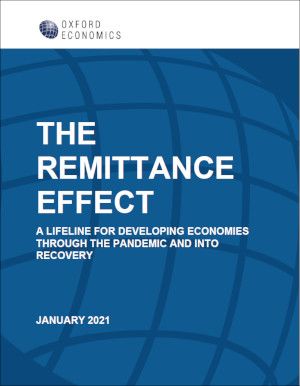Ungated Post | 27 Jan 2021
The remittance effect: A lifeline for developing economies through the pandemic and into recovery

The rising value of remittance flows into developing countries in recent years is often not widely appreciated. At a macro level, remittances support growth and are less volatile than other private capital flows, tending to be relatively stable through the business cycle. At a micro level, remittances benefit recipient households in developing countries by providing an additional source of income and lower incidences of extreme poverty. Remittances act as a form of ‘social insurance’, supporting households’ capabilities to resist economic shocks. Remittances help recipient households to increase spending on essential goods and services, invest in healthcare and education, as well as allowing them to build their assets, both liquid (cash) and fixed (property), enhancing access to financial services and investment opportunities.
Understanding the role and importance of remittances is particularly important at the current juncture, with the global economy experiencing a uniquely sharp and synchronized shock as a result of COVID-19. This report examines the available evidence on remittance flows and their potential economic effects. The report explores and shows how remittance flows remain a crucial lifeline in supporting developing economies through the current pandemic crisis and into the recovery.
Although remittances slowed during the pandemic, they remained more resilient than other private capital flows, making them even more important as a source of foreign inflows for receiving countries. While the World Bank estimates that remittance flows to developing countries (low-and-middle income economies) contracted by 7.0% in 2020, this decline is likely to have been far less severe than the downturn in private investor capital. Looking forward, the World Bank predicts that remittance flows to developing countries will contract by a further 7.5% in 2021. But the outlook remains subject to a high degree of uncertainty with both upside and downside risks. A wider set of dynamics – including central bank data outturns for 2020, economic outlooks for the world economy in 2021, survey data and remittance consumer market fundamentals – suggest that while there are downside risks, there is also potential that 2020 and 2021 will not turn out as weak as predicted by the World Bank and for a period of strong remittance growth in the medium-term as sender economies recover and demand from developing economies remains high.
Our macro consulting team are world leaders in quantitative economic analysis, working with clients around the globe and across sectors to build models, forecast markets and evaluate interventions using state-of-the art techniques. Lead consultants on this project were:
Oxford Economics’ team is expert at applying advanced economic tools that provide valuable insights into today’s most pressing business, financial, and policy issues.
To find out more about our capabilities, contact:
EMEA
Paul Donnelly
020 3910 8000
Email
Americas
Jeffrey Klonoski
+1 646 503 3048
Email
Asia
Rhianne Clark
+65 6850 0112
Email
Related Services

Post
KPMG M&A Outlook 2026: Between Uncertainty, Resilience, and Seizing Opportunities
Discover how Germany’s M&A landscape is evolving – with a focus on growth, AI and post-merger value creation.
Find Out More
Post
Silver, the next generation metal
This report highlights the critical role silver plays in data centres and artificial intelligence (AI), automotive and electric vehicles (EVs), and solar energy photovoltaics (PVs). With these sectors expected to expand significantly over the coming years, we expect future silver demand to be strong.
Find Out More
Post
Powering the UK Data Boom: The Nuclear Solution to the UK’s Data Centre Energy Crunch
The UK’s data centre sector is expanding rapidly as digitalisation, cloud computing, and artificial intelligence (AI) drive surging demand for high-performance computing infrastructure.
Find Out More